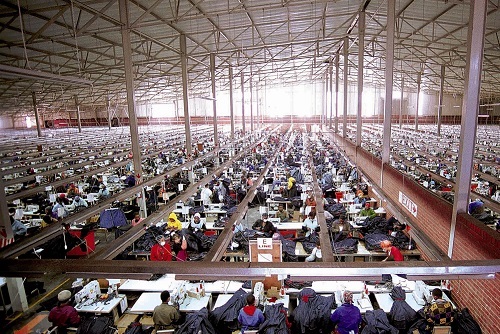Mohloai Mpesi
In a shocking revelation, over 120 women from various factories in Maseru have come forward, testifying that they were coerced into sexual acts with male supervisors to retain their jobs.
These distressing accounts emerged during the two-day Dissemination workshop on International Civil and Political Rights Concluding Observations and Recommendations held at Lancers Inn this week.
Advocate Rapelang Mosae, a Human Rights and Governance Consultant, shed light on a distressing reality outlined in the Workers’ Rights Consortium (WRC) report.
Mosae said the report indicated that female workers in local factories were compelled to engage in sexual activities to secure contracts or maintain their employment.
According to the WRC, these incidents extended to allegations of rape, sexual assault, and harassment within garment factories operated by multinational corporations in Maseru.
“Some alleged that they had been raped on the factory premises. Some said they had contracted HIV from supervisors who withheld their salaries until they agreed to have unprotected sex. Those who complained were sacked,†said Mosae.
He stressed that the WRC report particularly pointed out that Nien Hsing factories were hotspots for such exploitative practices, where women workers were subjected to persistent sexual coercion, verbal harassment, and unwanted physical contact by supervisors.
Mosae emphasised that these revelations highlighted the obligations of both the State and Non-State Actors as outlined in the International Covenant on Civil and Political Rights (ICCPR) and its protocols.
States, he explained, were expected to enact and enforce laws that compel businesses to respect human rights and establish a regulatory framework that fosters such respect.
Furthermore, he said corporations and business entities were called upon to take measures to prevent, mitigate, and rectify human rights abuses they contribute to.
The textile industry remains a major employer in Lesotho, with Nien Hsing employing over 6,000 individuals.
In 2019, landmark agreements were signed by three leading apparel brands, a major supplier of denim, and a coalition of labor unions and women’s rights organizations to prevent and address gender-based violence and harassment (GBVH) in garment factories in Lesotho.
About 10,000 garment workers were producing denim clothing in five factories owned by Nien Hsing supplying international brands Levi Strauss & Co., Kontoor Brands (Lee and Wrangler Jeans), and The Children’s Place.
The binding agreements were reached after an investigation conducted by WRC, on behalf of the Council on Ethics of the Norwegian government pension fund, identified widespread gender-based violence and harassment at the facilities.
Under the agreements, Nien Hsing committed to a robust Program to Eliminate GBVH in Lesotho (Anti-GBVH Program), centered on a mechanism independent of the company to field and investigate worker complaints and ensure remedies, including terminations of perpetrators where appropriate.
Nien Hsing’s commitments are enforceable through agreements with the apparel brands, which obligate them to use their economic power to ensure its compliance.
Sexual violence against garment workers is a well-documented worldwide problem. The Lesotho agreements, according to RWC, represented the first instance in which brands and their supplier had entered into enforceable agreements with worker representatives to stop GBVH and protect workers.
In May this year, RWC published a report detailing the ongoing process of implementing the groundbreaking Anti-GBVH Program at Nien Hsing, established in 2020 through these landmark agreements.
In a glimmer of hope, according to the report, changes are starting to emerge, as an employee from Nien Hsing said: “Our situation changed a lot. We can now report incidences of GBVH, I speak openly to workers about how the WRW assisted me in my case and how grateful I am for them.â€
However, Mosae this week said it was disconcerting to note that antagonistic management at Nien Hsing was inhibiting workers’ freedom of association.
He explained that employees feared dismissal if they chose to join local unions or organizations.
According to the RWC report, one worker at C&Y stated: “We do not even try to organise, because we do not want to lose our jobsâ€.
An employee from Nien Hsing International reportedly said likewise: “Trying to organize will likely cost one a job. So, I have not even triedâ€.




